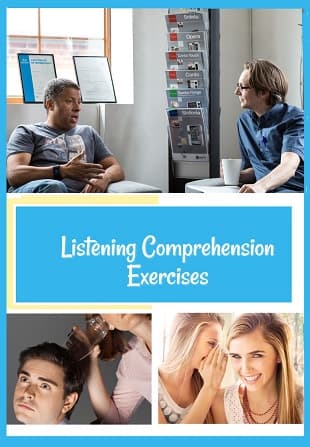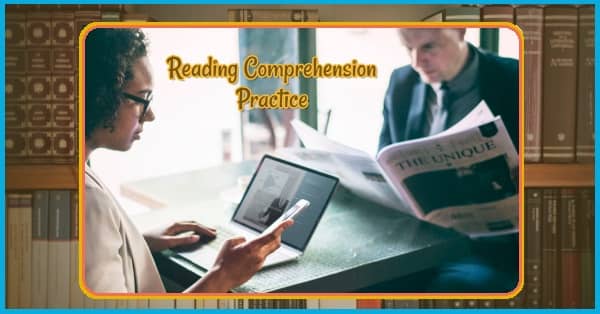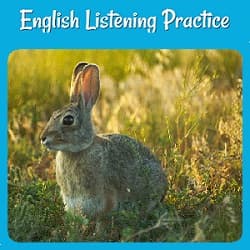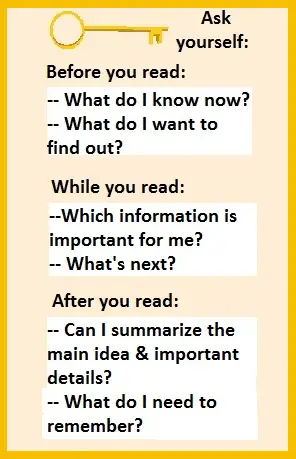English Listening & Reading
Comprehension Exercises
Listening and reading comprehension exercises can help you understand English better. You need to read and listen to English often to build your English vocabulary and fluency.
Do you need a way to check how much you understand?
Try some of the comprehension exercises on this page!
There are several kinds of exercises on different subjects and at different levels. Choose the ones that are best for you!
Many of the videos also have a transcript-- a written version of what you heard.
This means that you can also use them to practice your reading and increase your vocabulary. (It helps because you can both see and hear the words-- often more than once.)
Your will also get better at speaking and writing, as the rhythms of English become more familiar.
Hints for These Talks & Exercises
Some of the TED talks have subtitles or translation into several common languages. Listen in English first. Then, if you want, you can listen or read in your own language to check your understanding.
The videos, articles, and their exercises are in the Listening or Reading Comprehension sections below. Each section starts with beginning levels, then more advanced. Here are links to jump to the High-Intermediate Advanced Listening or Advanced Reading sections, so you won't need to scroll as far.
At the bottom of the page, the same videos and exercises are listed by topic: health and psychology, the environment, and society & social change.
Listening Comprehension Exercises
Beginning or Multi-level Listening
> ESL Lab: Lots of different subjects at several levels. These are mostly about everyday life and include quizzes and related grammar exercises. A related site, Daily ESL, has short readings on daily life topics with listen-along audio.
> USA Learns has a number of entertaining videos. They follow several families through different everyday experiences (working and job hunting, renting an apartment, getting phone service, resolving family problems.), Each lesson also has practice activities.
Teachers may sign up a class, and the site will report individual student activities and quiz results. I used this site and their videos with several classes and loved it! The ongoing stories are easy to follow, and provide lots of repeat exposure to vocabulary and some grammar points.
> The British Council has several series of Elementary Podcasts. They tell stories about everyday life. Use their interactive exercises to practice what you have just heard.

> The Clilstore has videos or audio recordings with transcripts linked to dictionaries in many languages.
(Be sure to select English if that's what you want to practice!-- They offer reading and listening materials to learn a number of different languages.)
This free service of the European Commission makes it possible to read slightly harder texts on subjects you're interested in, since you can click on any unknown word and learn its meaning(s) in your language.
The recordings are arranged by level (A1- C2-- basically beginner to very fluent.)
They have a lot of TED talks plus songs, interviews, and science and history articles. They even offer lesson plans, folktales, and an article on the greatest children's stories ever. Many selections also have exercises or quizzes for extra practice.
You can find comprehension and discussion questions for several very interesting A2 level (easy) TED talks on hope at English Listening Practice (and Answers.)
Intermediate Listeniing
(As noted, these also can be used to practice your reading.)
> Listening and Reading Comprehension Practice for the 2 TED Talks on Nature’s Genius and Clean Energy policy
>A Comprehension Worksheet on a TED talk about cancer
> Lesson Plan on the Columbian Exchange includes a listening comprehension exercise.
Hign-Intermediate or Advanced Listening
> Steve Jobs' 2005 Stanford Gradation Speech explains the idioms and less-common vocabulary he uses. This will help you understand his classic commencement address.
> This ESL Listening Worksheet pdf has comprehension and discussion questions for an exceptional TED talk on "the Danger of a Single Story."
> A Comprehension Test on a TED talk on motivation. (It tests either reading-- if you read the transcript-- or listening/watching.)
Reading Comprehension Exercises

Multi-level Readings, Beginning up:
> Newsela-- the same news report at different reading levels. They have a great variety of interesting articles, recent and older. Most have quizzes to check your understanding. They’re free, but you have to register.
> Reading Comprehension Questions on a Commencement Address on Success
> Practice for the TOEFL and Other Reading Tests (with a reading selection about early American agriculture)
> Reading Comprehension Worksheet pdf on Education’s Death Valley (a TED video with transcript to read-- or you can listen to it by following the link).
> Reading Comprehension Test Practice based on the TED talk “Where ideas come from: (This also can be used for listening practice.)
> Daily ESL.com: Short articles about daily life. After studying these you could use the words, common phrases, and ideas in conversation. There are audio recordings with them so you can also listen.
> What's the Relationship Between Thought & Language? Links to several fascinating articles and TED talks on the ways our language affects our thinking and perspective. Good practice reading & listening-- and comprehension questions with the TED Ed lesson on metaphors.
> Reading Comprehension Worksheets (It also lists pdfs for some of the pages above.)
For Classrooms: Reading Lesson Plans at Modest Prices
> Reading Comprehension Lesson Plans.
Hign Intermediate or Advanced Reading
> A Practice Reading Test (on psychodynamic therapies)
> Check Your Reading Skill (with a selection on mental illness)
See also many of the readings by topic in the list below-- and see Reading Articles to Improve English and the pages on communication, leadership, and science articles, etc. linked from it.
Reading & Listening Comprehension Exercises by Topic
(These are intermediate- high intermediate unless noted.)
Understanding our Bodies and our Minds (Health & Psychology)
>A Comprehension Worksheet on a TED talk about cancer
> A Comprehension Test on a TED talk on motivation. (It tests either reading-- if you read the transcript-- or listening/watching.)
> Reading Comprehension Test Practice based on the TED talk “Where ideas come from: (This also can be used for listening practice.)
> A Practice Reading Test (on psychodynamic therapies)
> Check Your Reading Skill (with a selection on mental illness)
> What's the Relationship Between Thought & Language?
Understanding Nature and "Going Green"
> Listening and Reading Comprehension Practice: 2 TED Talks on Nature’s Genius and Clean Energy policy
Understanding Society: History, Cultures, and Social Change
> Practice for the TOEFL and Other Reading Tests (with a reading selection about early American agriculture)
> Reading Comprehension Worksheet pdf on Education’s Death Valley (a TED video with transcript to read-- or you can listen to it by following the link).
What next?
For some suggestions on how to read English better, see ESL Reading and Reading Strategies Practice. For ideas for conversation and speaking more fluently, see English Conversation Practice.
There are lots of vocabulary exercises, along with games, at Online Vocabulary Games and How to Learn Professional Vocabulary.
Didn't find what you
needed? Explain what you want in the search box below.
(For example, cognates, past tense practice, or 'get along with.') Click to see the related pages on EnglishHints.
| site search by freefind | advanced |










